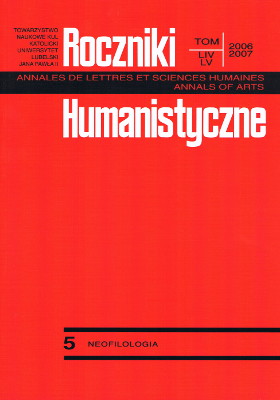Storyline Approach in the Context of Integrating Foreign Language Learning and Teaching with General Education
Abstract
Storyline Approach is a methodological concept originally developed to enhance general education in mother tongue. It is a concept concerning holistic, integrated and topic based education. That is why the assets of this approach considerably increase the effectiveness of teaching and learning foreign languages, especially in case of integrating the process of teaching a language with other subjects.
The aim of the article is to prove the efficiency and attractiveness of the Storyline Approach in the context of integrated teaching. In the first part the author presents arguments for the necessity of integrated education, including language learning and teaching. Next, she outlines the working principles of the Storyline Approach. The further step is a reflection regarding the advantages of applying the Storyline Approach in the process of foreign language learning and teaching. The last part of the article is a presentation of some elements of the storyline module, combining foreign language and general education. The module has been developed for teaching German as a foreign language within the Creative Dialogues Project of Socrates Comenius 2.1. The author of the article is a member of a partnership group working on this project. The main subject of the module is “Schlosshotel” (castle hotel).
References
Apeltauer E. (1997): Grundlagen des Erst- und Fremdsprachenerwerbs, Berlin–München: Langenscheidt.
Bell S. (1994): Storyline as an Approach to Language Teaching, „Die Neueren Sprachen”, H. 1, s. 5-25.
Bleyhl W. (red.) (2002): Fremdsprachen in der Grundschule. Grundlagen und Praxisbeispiele, Hannover: Schroedel.
Fehse K. D. (1994): Storyline – ein Modell für inhalts- und handlungsorientiertes Lernen im Fremdsprachenunterricht, „Die Neueren Sprachen”, H. 1, s. 26-53.
Fehse K. D., Kocher D. (2002): Storyline projects in the foreign language classroom, w: O. Kühn, O. Mentz, Zwischen Kreativität, Konstruktion und Emotion, Herbolzheim: Centaurus Verlag, s. 187-199.
Kocher D. (1999): Das Klassenzimmer als Lernwerkstatt. Medien und Kommunikation im Englischunterricht nach der Storyline-Methode, Hamburg: Verlag Dr. Kovač.
Materniak M. (2005a): Wspieranie ucznia szczególnie uzdolnionego na przykładzie wiedeńskiej szkoły sir-karl-popper-schule, w: B. Kmieć, Spotkania Polska – Austria, Częstochowa: Wydawnictwo Regionalnego Ośrodka Doskonalenia Nauczycieli „WOM”, s. 119-126.
Materniak M. (2005b): Podejście „storyline” a proces nauczania/uczenia się języków obcych na etapie przejściowym, w: Materiały konferencyjne III Ogólnopolskiej Konferencji Naukowo-Dydaktycznej „Języki obce przepustką do zjednoczonej Europy i świata”, Ustroń 08-10.04.2005. Studium Praktycznej Nauki Języków Obcych Politechniki Śląskiej, s. 251-258.
Materniak M. (2005c): Storyline-Ansatz und Fremdsprachenunterricht in Übergangsphasen, „Чуждо языковые обучение (Foreign Language Teaching)”, H. 4, s. 32-41.
Materniak M. (2006): Kreative Dialoge mit und durch Storyline, „SOKRATES aktuell”, 2, s. 32-41.
Sękowski A. E. (2004): Inteligencja, twórczość, mądrość a wybitne zdolności, w: tenże, Psychologia zdolności, Warszawa: Wydawnictwo Naukowe PWN, s. 173-191.
Sternberg R. J. (1997): Successful intelligence, New York: Plume.
Wolff D. (2002): Der – etwas? – andere Französischunterricht: Kann er auf die Unterstützung der Lern- und Sprachpsychologen zählen?, w: O. Kühn, O. Mentz, Zwischen Kreativität, Konstruktion und Emotion, Herbolzheim: Centaurus Verlag, s. 202-215.
Copyright (c) 2007 Roczniki Humanistyczne

This work is licensed under a Creative Commons Attribution-NonCommercial-NoDerivatives 4.0 International License.





